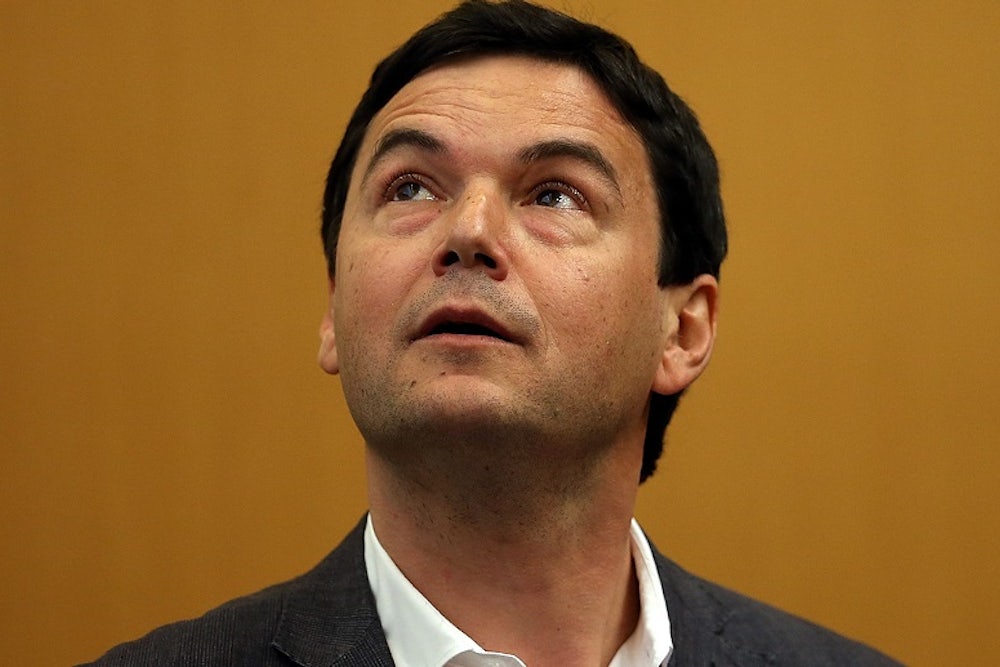By now, you’ve probably heard of Thomas Piketty, the 42-year-old French economist and author of Capital in the Twenty First Century. Piketty has become something of a rock star in the economics world. Capital has been sold out for weeks and is No. 1 on Amazon’s bestseller list. He’s currently on tour—drawing overflow crowds to bookstores and lecture halls in Washington D.C., New York, Boston and San Francisco.
It’s Piketty’s analysis that has drawn the most attention. In the book, he argues that inequality is an inevitable outgrowth of capitalism—and that the postwar period, when the poor and middle class shared more equally in prosperity, was just a happy interregnum. His proposed solution to the problem—a “global tax on capital”—has gotten far less attention.
Mostly that’s because experts have dismissed the idea as politically unrealistic. To some critics, that makes the whole discussion sort of pointless. “To begin with, in a world where only a few countries accurately measure high incomes, it would require an entirely new tax base, a worldwide Domesday Book recording an annual measure of everyone’s personal net worth,” James Galbraith writes in Dissent Magazine. “That is beyond the abilities of even the NSA. And if the proposal is utopian, which is a synonym for futile, then why make it? Why spend an entire chapter on it—unless perhaps to incite the naive?”
But put political considerations aside for a moment. How might such a proposal work? Would it really help reduce inequality? And would it do so without causing more harm?
The concept is actually pretty straightforward. Taxing capital means taxing net wealth—in other words, taxing the assets a person has rather than the income that person makes. That would include everything from land and houses to patents and software to stocks and bonds to art and yachts, minus all debts. The tax, in Piketty’s vision, would be progressive: Those with more assets would pay more. For instance, Piketty suggests that the tax would be zero for those with less than a million euros in assets. For those with between one and five million euros, it would be one percent. Above five million euros, it would be two percent. He also proposed a much higher tax (five or ten percent) on fortunes larger than a billion euros. (1 euro = $1.38 right now.)
A wealth tax could affect the economy in many ways, but it’s hard to be certain about how. The limited evidence we have comes from those few countries with such taxes in place already. When an individual country implements a wealth tax, it incentivizes people to stash their wealth in tax havens and invest abroad. This tax evasion reduces the effectiveness of the tax and the capital flight hurts economic growth. In a 2009 paper on France’s wealth tax, Eric Pichet found evidence for both of those effects. David Seim found that Sweden’s wealth tax, which was abolished in 2007, led to significant tax evasion as well.
Piketty’s tax would, in theory, avoid this problem because it’d be global—there’d be no safe haven where rich people could stash their wealth. To guarantee compliance, Piketty would impose sanctions against tax havens. It’s possible that wealthy people might then find other ways to evade the tax—and those ways might be damaging to the economy. In a guest post at the National Review, James Wetzler argues that the super-wealthy will sell assets in order to pay off the tax, decreasing investment, productivity and, eventually, wages. Then again, it’s also possible that such a tax would spur investors to make more productive use out of idle resources—or to sell them to someone who will. Under that theory, investment would increase and the economy would actually grow faster.
Gabriel Zucman, an economics professor at the University of Berkeley and a frequent collaborator with Piketty, does not envision that the wealth tax would have a meaningful effect on growth or investment, though he admits that there is little evidence on it. “There really isn’t a good empirical study on this question,” Zucman said. “In theory, it can go in any direction. It could increase savings and investment or it could decrease savings and investment. In practice, it’s very hard to tell.” Zucman pointed out that the savings rate in the U.S. and U.K. was the same in the 19th century as it is today, despite major differences in the tax regimes in each period.
The potential effect on assets prices is another concern. Some economists, such as Wetzler, worry that a wealth tax could cause investors to sell assets such as stocks and bonds and depress asset prices. Zucman is not concerned with this either, because the tax rate would be only a few percentage points. “This type of tax would have relatively modest effects even if we have to be careful given the limits of our knowledge,” he said. Meanwhile, the tax would generate a ton of revenue—money that could be spent either on direct subsidies to less affluent people or on public programs from which the poor and middle class benefit. Zucman calculates that a 2 percent tax on fortunes over $4 million would bring in $500 billion annually in the U.S. Piketty also suggests using that revenue to decrease the property tax. Others have proposed using it to flatten the income tax code or lower other taxes such as the estate tax or capital gains tax. These features would have different effects on investment and growth as well.
Could governments use the revenue wisely? Could they even collect it? Many will find those propositions hard to believe. But Piketty himself admits the proposal is “utopian.” The point is to emphasize the need for bold, dramatic efforts to combat inequality. And that’s something that shouldn’t be beyond the political imagination.
